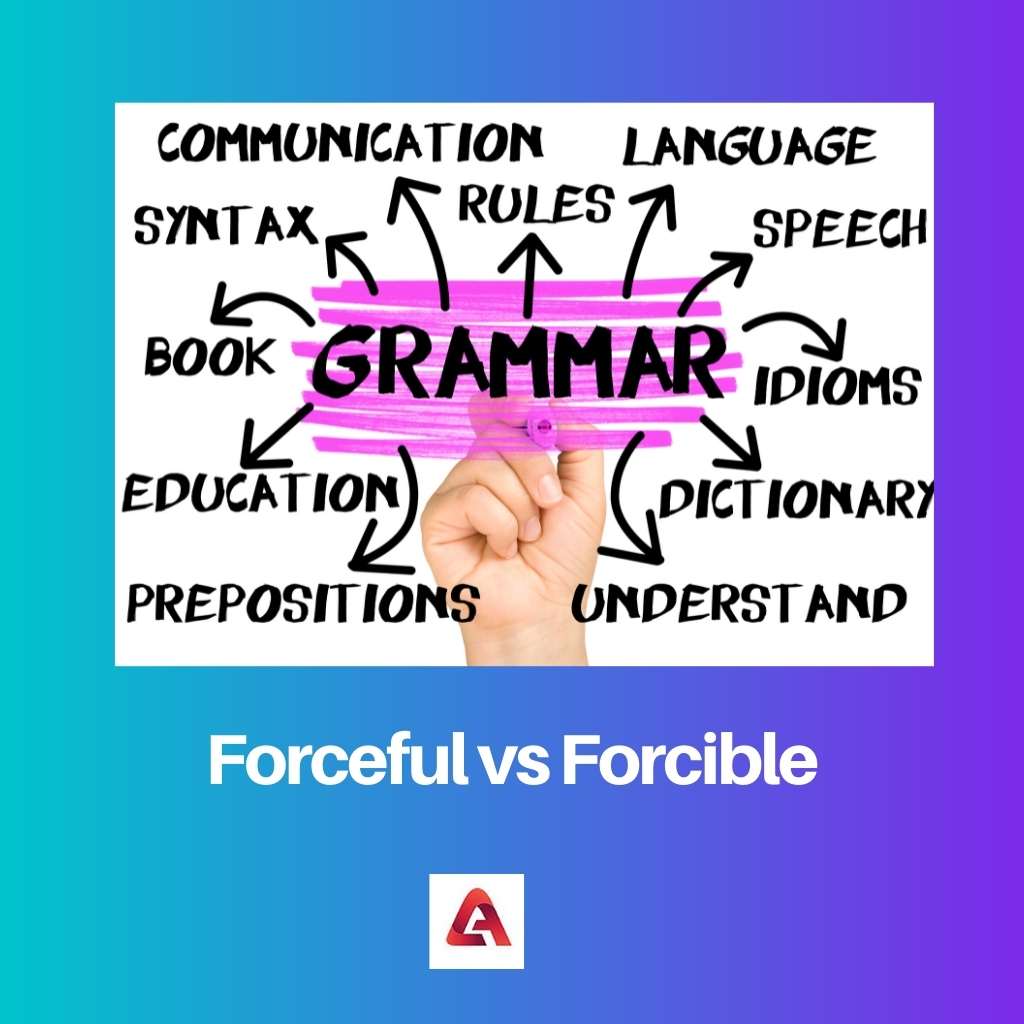Forceful and forcible have their origination from the same term, “force”. They differ from each other not only for their differences in the suffix but also due to other parameters.
These two words might overlap in certain cases but forceful is used to denote powerfully and forcibly should be used to emphasize the use of force.
Key Takeaways
- Forceful describes actions or behaviors that display strength or power, while forcible refers to actions that involve physical force or coercion.
- Forceful can apply to physical and non-physical situations, while forcible is used in physical actions or legal matters.
- Both terms can describe assertive or aggressive behavior but have distinct connotations and uses.
Forceful vs Forcible
Forceful is an adjective that describes something or someone that has a strong impact, is convincing, or is marked by force. It is used to describe language, arguments, or speeches. Forcible is also an adjective, but it describes something that is achieved through the use of force or coercion. It is used to describe actions or behaviors that involve physical force.

Forceful is the term that can be aligned to the individual or an element that has a tint of effectiveness or power. Individuals or elements being assertive can be described a forceful.
Forceful individuals or substances generate a specific amount of influence to the audience or the receiving end.
Any specific activity that has been conducted with the help of force can be referred to as forcible. Forcible can be directed to any activity that has been carried out by implementing physical strength or catalyst.
The act is mainly carried out with the application of force despite having some resistance or barriers.
Comparison Table
| Parameters Of Comparison | Forceful | Forcible |
|---|---|---|
| Meanings | Forceful means something strong, powerful, assertive, and vigorous. It is slightly pejorative in its nature. | Forcible means something that has been done by force, or against the will of someone, implying some sort of physical force. |
| Synonyms | Some common synonyms of forceful are dynamic, energetic, assertive, and potent. | Some common synonyms of forcible are compulsory, enforced, involuntary and violent. |
| Antonyms | Some common antonyms of forceful are submissive and weak. | Some common antonyms of forcible are nonaggressive, weak, fragile. |
| Time of origination | The word forcibly was first used during the 15th century. | The word forceful was first used during the year 1570 approximately. |
| Example | The government needs to imply forceful measures to recover the economy of the country. The forceful nature of the storms in West Bengal brings huge devastation to the Sunderbans. | The robbers made a forcible entry to the house by breaking the doors. The forcible conversion into Islam took place during the Mughal rule in India. |
What is Forceful?
The term, “forceful” has first come into existence and it has been initially used during the 1570s. The term, “forceful” indicates a substance or individual that is powerful.
It also indicates the things or individuals who can be categorized under assertive. Any personality that is associated with a particular effect can be referred to as forceful.
For broadly explaining the term, an example of a speaker or advertising can be given.
A speaker can be indicated to be forceful for his or her capability to of reaching out to the audience and convey his or her ideas during the process of orienting or narrating.
As the large-scale audience can be influenced by the method of advertisement. Hence, the advertisement can be referred to as forceful for generating influence.
Besides these, the media can also be considered as forceful as it influences the audience to view the unnoticed news
or incidents that have occurred in the world. another example is a book as it draws people’s minds into various fields of matters.
The term, “forceful” can be used for indicating or describing any particular thing, argument, or individual. Forcefulness is the noun of this term which is a derivative.
What is Forcible?
The term, “forcible” was first known to be used during the 15th century. The term, “forcible” indicates the work that has been done with the application of force.
The term is also associated with a particular kind of energy. With the use of the physical ability, a force can be implied to substances or individuals that can be categorized under this term.
The act that can be classified under violence can be referred to as “forcible”. For instance, when an individual disagrees to do a certain activity, he or she is made to do it with the application of force.
This application of force to change the will of someone indicated the term.
As an example, we can state that the term forcible can be used for the thieves who break down doors or windows to make an entry to the house for carrying out the theft.
In this case, the windows or doors of the house were broken down forcibly by the thieves against the will of the people living in the house.
Thus, this term can be referred to as an activity that is conducted by force which results in making an effect even in the presence of opposition or resistance.
Main Differences Between Forceful and Forcible
- The word forceful is used to denote something assertive while forcible is used to denote things that are to be done by force.
- Some synonyms of Forceful are dynamic, energetic, potent, assertive while that of forcible are involuntary, enforced, and compulsory.
- Antonym of Forceful is submissive while that of forcible is fragile.
- The word forceful was used for the first time in 1570 whereas forcible was used in the 15th century.
- The word Forceful has nothing to do with physical energy but the forcible has an association with physical energy.



